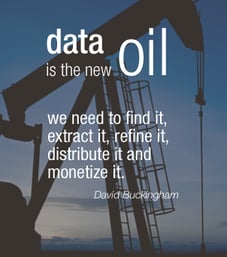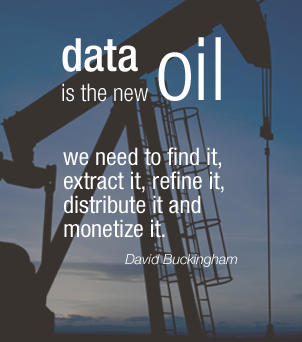 |
Data is "oil in the new economy," and that's having a profound effect on how retailers will do business moving forward.
By now, most retailers know that digital technologies have irreversibly altered the way consumers shop, and that the key to success in this crowded industry has a lot to do with how well a retailer can apply insights gleaned from all of that data. Perhaps Alibaba's CEO Daniel Zhang summed it up best when he told a crowd of marketers and media insiders at Nielsen's Consumer 360 Conference in Washington, D.C., that "data is oil in the new economy."
It's true - data is the lifeblood of business today, and its uses range from better ad targeting and messaging to smarter supply chain management and more accurate pricing. This will become even more apparent over the next few years as more and more consumers use their mobile devices as vehicles to move through each purchasing decision.
Retail marketing leaders should be more Silicon Valley than Madison Avenue
The Don Draper model of marketing is quickly receding into history as modern marketing becomes more of a quantitative discipline. It's not enough for marketers to talk about branding and emotional connections and other similarly vague concepts today. To get anything done, marketers had better have the backing of solid data to prove the validity of a campaign idea and the means to measure ROI in terms of hard numbers.
"For the last decade, there has been a focus on the quantitative side versus the qualitative side," Craig Miller, Chief Marketing Officer at Spotify, told Marketing Dive in an interview. "Once upon a time, it was innovative to have digital marketers, but now I think if you don't have that, you're missing out."
A separate report from Marketing Dive explained that the premium that many organizations are putting on marketing data has led to a new opening in the C-suite: The Chief Marketing Technology Officer, or CMTO. While this position is still so new that it defies a concrete definition, in the early going it seems that the CMTO's role is to bring on new technologies to stay ahead of the curve while still bringing rigor to the onboarding process for marketing tech tools. Essentially, the CMTO should find new ways to collect and analyze data, while remembering that there's a purpose to it: to create actionable insights. It's not the size of the database or the flashiness of the tools - it's all in how you use them.
What is the ultimate end of marketing data and technologies?
The main goal of retail marketing today is arguably to make the whole shopping experience completely customer-centric, or as Apparel put it, to "develop more than a 360-degree view of the customer." In practice, this means gathering intelligence not only on the customers who make a purchase from a retailer, but also the ones who simply browse a store shelf or website without buying anything.
To create a more customer-centric shopping experience, retailers must collect enough data to create detailed profiles of every single buyer. Everything from demographic data to shopping behaviors must go into building out a complete understanding of the customers as individuals, as well as what moves them in the aggregate. Martine Reardon, Chief Marketing Officer at Macy's, said that's exactly what her company is doing as it adopts a more data-driven approach to its business.
"Our analytics have convinced us today, more than ever, that our customer wants to shop when, where and how he or she prefers," Reardon told Apparel. "That means being always available - in-store, on the Internet via desktop or laptop or on a mobile device. We've shifted to an omni-model, keeping in mind that many customers begin shopping online, then go to the store to complete their purchase; others start by shopping in store then buying from their mobile device on their couch at night. Understanding the customer journey has led us to rapidly evolve right along with shoppers, to take risks calculated to continue our momentum and drive growth."
Here, Reardon hits on some key themes - specifically, mass personalization and omnichannel retailing - that are driving the wider world of retail. For example, by understanding each customer's personal preferences, retailers can align their product offerings around what price points and marketing messages each customer will respond to most favorably - also known as dynamic pricing. This isn't an option anymore - research from the CMO Council found that more than half of U.S. and Canadian shoppers will ditch a retailer if they don't receive personalized, targeted offers.
The ease with which businesses can collect customer data is having a transformative effect on consumers and retailers alike. Consumers are increasingly expecting a more personalized shopping experience, and retailers are responding by prioritizing marketing technology and human resources that can deliver what shoppers are looking for. In light of this, retail success today will look more like something out of a math textbook than an award-winning ad campaign.













